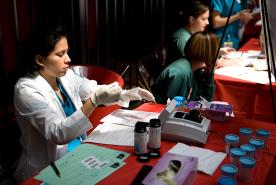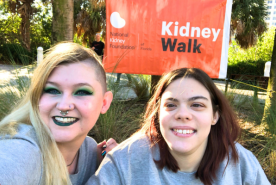July 06, 2018
Asking someone to consider kidney donation may be one of the hardest questions you ever have to ask.
You may be reluctant for any number of reasons; however, you may be surprised to learn how many people are willing to find out more about the process and go forward with testing.
Based on research the NKF has conducted with its members, below are three of the most common barriers that prevent patients from asking for a kidney, along with tips on how to overcome these hurdles.
Barrier Number One:
"I am afraid that my donor's health will suffer"
Those who ultimately choose to become kidney donors are typically much healthier than the general population. Potential kidney donors are evaluated carefully (both physically and mentally) before they’re able to donate.
Research shows that, as with any surgery, there is a small risk of complications for the donor. You can learn more about the potential risks here. To donate a kidney to a loved one, friend, or even a stranger, is truly to give the gift of life. Living donation frequently is a positive experience for both the giver and the receiver. Typically those who donate kidneys report they would do so again.
Barrier Number Two:
"I am afraid that medical bills and time off of work will cause a financial hardship for a potential living donor"
Generally, if the donation is to a family member or friend, the recipient's insurance and/or Medicare will pay for testing and surgery expenses. However, the donor might be responsible for travel expenses (if the donor and recipient live in different towns/states) and follow-up care, in addition to lost wages from taking time off work.
Because donors are never financially compensated, be sure to ask the financial counselor and/or social worker at the transplant center for assistance with these issues or any questions that you may have about the costs associated with donation.
Donors may be eligible for sick leave, state disability and the Family and Medical Leave Act (FMLA). Some follow-up expenses may also not be covered, so it's important to discuss these matters with the specific transplant center. Also the National Living Donor Assistance Program provides financial assistance to those who want to donate an organ but are not able to afford the travel and living expenses associated with organ donation. To learn more about financial issues, click here.
Barrier Number Three:
"I do not like to ask anyone for anything"
Asking for help can be daunting to some, but you can start just by beginning to tell your story. This opens up the lines of communication.
Many people in your circle may not know about your condition or that being a living kidney donor is even an option. By starting a dialogue and educating those around you, you may find that there are many individuals who will ask you how they can help.
Ask your family and friends to help spread the word. It's important to keep your options open as you never know when a potential donor is going to walk through the door!

















